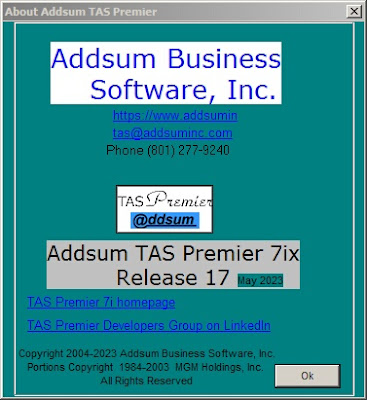We are pleased to announce release 17 in the TAS Premier 7ix series. This release contains updates to the runtime and development system programs through May 1, 2023.
Release 16 came out on July 10, 2021, and was the first "7ix" release. These updates continue to build on our initial TAS Professional version 7 release in 2004 and then TAS Premier 7i in the fall of 2005.
Some of the new features include a COPYTOCLIPBOARD() function; a new third parameter in the SENDKEYS() function allowing developers to target an external windows/application; improvements relating to the TRANSX command; changes to the default behavior of the internal ASK button; the ability to upload files using FTP protocol over TLS/SSL (also known as FTPS, not to be confused with SFTP i.e. secure shell file transfer protocol) using an external executable that we developed written in the same language as the runtime; reenabling the FASTMM4 memory manager; and adding exception handling to the TLLFC() function.
Documentation updates are many including a new topic with respect to using colors in RUN programs, updates to reserved words primarily for legacy programs, adding documentation for the RTOD() function previously missing, plus documentation for new or improved features.
The older FTP function remains available but is not capable of sending files using FTPS protocol. The newly provided executable can upload files via both secure and insecure methods, supports options for the port number, connect tries, connect/read/transfer timeout settings, TLS options (require vs. explicit vs. implicit), transfer types, and passive mode. Any number of profiles can be established which can then be called from the TAS environment after being tested.
OpenSSL changes are expected later this year which will require changes both in the sending of secure e-mail (supported in Advanced Accounting) as well as FTP secure protocols, but we decided not to wait for those changes in order to provide FTPS capability now, which has not previously been available.
We previously had enabled the Borland replacement memory manager in an earlier runtime version, but we had a few users report harmless error messages sometimes when exiting the runtime, so we removed it. Based on some extensive testing, however, we have found that the use of that replacement memory manager is critical in Windows 10 and 11 operating systems when loading DLLs using the TLLFC() function, and so we have reenabled that memory manager in all executables where it applies. And the runtime executable still works just as well under prior Windows releases as well. We thought that exception errors that started to be encountered when using TLLFC() related to adding QRCODE() support in the prior (release 16) version, but in fact, it related to memory management issues in Windows 10 and now 11 (which reenabling FASTMM4 seems to resolve).
See the "Addsum Premier 7i features" under the topic "What's new in TAS Premier 7i" in the help files for more information as to all of the updates provided in this release.


No comments:
Post a Comment